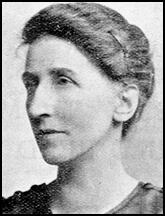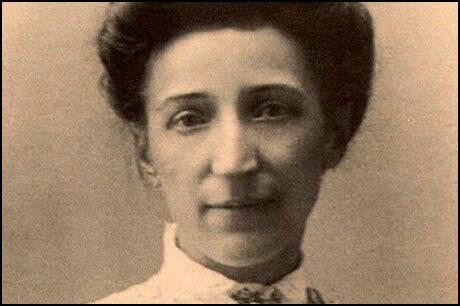Hannah Mitchell

Hannah Mitchell, the daughter of John Webster, a small farmer in Derbyshire, was born on 11th February 1871. Hannah received only two weeks of formal schooling and was kept busy on the farm and with domestic duties. Her three brothers did not have to work at home and she grew up with a strong awareness of gender inequalities.
At the age of fourteen Hannah had a vigorous row with her mother over the work she was expected to do. After being badly beaten with a stick, Hannah ran away from home. Hannah found work as a dressmaker in Bolton. Although she was only earning eight shillings a week, she managed to subscribe to a small library and over the next few years taught herself to read and write.
While working in Bolton, Hannah met Gibbon Mitchell, a tailor's cutter. Gibbon was the son of a widow with eight children and had worked since the age of ten. Gibbon was a socialist and the couple began attending meetings at the Bolton branch of the Independent Labour Party. Hannah and Gibbon became active in the trade union movement in Bolton during this period and avid readers The Clarion a journal produced by Robert Blatchford.
Hannah married Mitchell in 1895. Hannah insisted that they should share domestic duties. Although he agreed on principal with this, he found it difficult to live up to Hannah's expectations of how a husband should behave. She later pointed out in her autobiography that she gradually realised that "socialists are not necessarily feminists." Hannah also objected to the way her husband "handed over the wages and left all the worrying to me." She wrote that even "the most sympathetic man can never be made to understand that meals do not come up through the tablecloth, but have to be planned, bought and cooked."
In 1904 Hannah joined the local branch of Women's Social and Political Union (WSPU). Gibbon Mitchell supported her involvement and because of local hostility to the suffragettes was employed as one of the bodyguards at public meetings. Hannah's involvement in the movement grew and in 1905 she became a full-time worker for the WSPU.

Like many of the leading figures in the WSPU, Mitchell objected to the way that Emmeline Pankhurst and Christabel Pankhurst made important decisions without consulting fellow members. In 1907 Charlotte Despard persuaded her to join Women's Freedom League.
Mitchell was a pacifist and refused to become involved the WSPU army recruiting campaign in 1914. She joined the Independent Labour Party and other organised that opposed the war including the No-Conscription Fellowship and the Women's Peace Council.
In 1924 Hannah Mitchell was elected to the Manchester City Council. She remained an important political figure in Manchester until she retired. In her seventies Hannah wrote her autobiography The Hard Way Up (1968). Unfortunately, the book was not published until after her death on 22nd October 1956.
Primary Sources
(1) Hannah Mitchell, The Hard Way Up (1968)
My mother was a small, bird-like woman, rather pretty, with dark hair and eyes, and a clear complexion, her slim girlish figure well set off by the pretty frocks, and she liked to wear on Sundays. She could sing like a lark, and at times was perfectly charming. But her temper was so uncertain that we lived in constant fear of an outbreak which often lasted several days.
My father always seemed to me one of nature's gentlemen. He had a gentle, kindly temper, was independent without being aggressive, and neither feared the rich nor despised the poor. His only weakness was his submission to my mother's temper, which grew worse with the advent of each child. She would fall into violent passions about the merest trifles and drive us all out of the house for hours; sometimes we would have to spend the night in the barn sleeping on the hay. My father seemed totally unable to combat these storms, or even to protect us. He was always the first to leave the house when they broke out, and the last to return.
(2) Hannah Mitchell, The Hard Way Up (1968)
The nearest school was five miles away by the shortest cut over the hill, which made daily attendance impossible… My father and uncle had taught us all to read… My uncle taught me to write and I taught the two younger ones to read and write… It was a long and difficult task as neither of them was keen on learning. My uncle bought exercise books and set lines for me to copy such as 'Never put off till tomorrow what you can do today'.
We had no dictionary, so when I came across a word I didn't understand, or could not pronounce properly, I copied it and listened attentively to the preachers at chapel, until one of them used the doubtful word… I cherished my new word as a pearl of great price. Perhaps the church parson, making his yearly round of a scattered parish, would call at the farm, and over a cup of tea would talk kindly to us children. I sometimes ventured to ask him a few questions about books, but my mother thought this was a reflection on her, and it usually earned me a beating.
(3) Hannah Mitchell, The Hard Way Up (1968)
The procedure was to parade the principal streets on Saturday and Sunday evenings, each sex in groups or couples, until some adventurous male would make the first advance with some fatuous remark such as 'Can I see you home, miss?' If the girls responded, this constituted a sort of introduction. The same groups would meet for several weeks and chat together before ultimately pairing off. Sometimes it all ended with nothing definite, and the groups began to parade again… I was agreeably surprised when we walked out with them to find they attempted no familiarities, beyond taking one's arm in the darkness, or a light kiss at parting. I began to feel more at ease, although most of the young men were much better educated than myself. But my very mixed reading, a good memory and a ready wit enabled me to hold my own so well indeed that I became known as 'Miss Repartee'.

